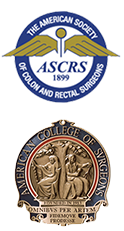Screening Colonoscopy
Colorectal cancer is the third most common cancer in the United States in both men and women. The average person’s lifetime risk of developing colorectal cancer is about one chance in 20. At least 6 out of every 10 deaths from colorectal cancer could be prevented if proper colorectal screening was performed.
What is screening and prevention?
Almost all cancers in the colon and rectum develop from polyps. Polyps are abnormal growths in the lining of the colon and rectum that can slowly and quietly grow and transform into cancer over a period of years. This process can be accelerated if you carry a gene for colorectal cancer or if you have inflammatory bowel disease such as ulcerative colitis or Crohn’s disease. Most polyps do not cause any symptoms. As a matter of fact most cancers do not cause symptoms until they get very large. The goal in screening is to detect and remove the polyps before they have a chance to develop into colorectal cancer. Screening can also find colorectal cancer early, when there is a greater chance that treatment will be most effective and lead to a cure.
What screening tests should be done?
The preferred colorectal cancer screening test is a colonoscopy. Colonoscopies are not only diagnostic such a detecting polyps or cancer but can also be therapeutic such as removing the polyps. Imaging studies such as CT colonoscopy, also known as “virtual colonoscopy” can be an alternative test but it can only detect polyps, the test can’t remove them. This would require another bowel preparation in order to have a colonoscopy. A less frequently used test would be a barium enema.
Who should be screened for colorectal cancer?
- All men and women should have a colonoscopy every 10 years beginning at age 50 if you are average risk and not African-American
- African-Americans should have a colonoscopy every 10 years starting at the age of 45 because of a higher incidence of colorectal cancer
- People who have symptoms such as a change in bowel habits, bleeding, or test positive for blood in their stool.
- People with a close relative, such as sibling, parent, or child who has had colorectal cancer may need a colonoscopy starting at the age of 40 and may need a colonoscopy more frequently such as every 5 years if negative
- People with a family history of colorectal cancer in several close relatives and several generations, especially cancers occurring at a young age, should receive genetic counseling and consider genetic testing to evaluate for possible inherited conditions such as hereditary nonpolyposis syndrome or familial adenomatous polyposis (FAP). People with this family medical history should have a colonoscopy at a much younger age sometimes starting in puberty or early 20’s.
- People who have had any polyps found and removed should have a colonoscopy every 3-5 years after examination.
- People with a history of extensive inflammatory bowel disease such as ulcerative colitis or Crohn’s disease for 8 or more years should have a colonoscopic evaluation with biopsies every one to two years.
- Women with a personal history of breast, ovarian or uterine cancer may have a higher risk of colorectal cancer and should undergo colonoscopy every 5 years starting at the age of 40.
How can colorectal cancer be prevented?
The most important tool for prevention is getting proper screening. Exercise and maintaining a high fiber diet may play a role in prevention. Avoiding smoking and reduction of alcohol consumption has been beneficial. Some evidence has been linked to a reduction of polyps and colorectal cancer by taking a regular dose of aspirin every day. However, studies of low-dose aspirin or short-term use of aspirin haven’t found this to be true. It is likely that you may be able to reduce your risk of colorectal cancer by taking large doses of aspirin over a long period of time. But using aspirin in this way comes with a risk of side effects such as gastrointestinal bleeding and ulcers. Not enough evidence exists to recommend regular aspirin to people who have an average risk of colorectal cancer.





